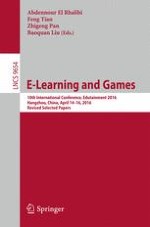2016 | OriginalPaper | Chapter
Survey: Development and Analysis of a Games-Based Crisis Scenario Generation System
Authors : Pisit Praiwattana, Abdennour El Rhalibi
Published in: E-Learning and Games
Publisher: Springer International Publishing
Activate our intelligent search to find suitable subject content or patents.
Select sections of text to find matching patents with Artificial Intelligence. powered by
Select sections of text to find additional relevant content using AI-assisted search. powered by
